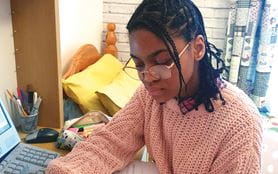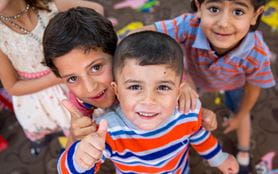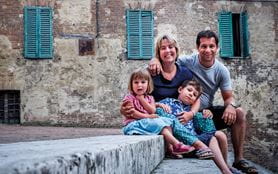Supporting Hope and Homes for Children's crisis response
Related people
Headlines in this article
Related news and insights
Publications: 30 November 2023
Publications: 08 September 2023
Street Child invests in the future as our charity partnership draws to a close
Publications: 14 December 2022
Publications: 08 December 2022

Eighteen months into our global charity partnership with Hope and Homes for Children, we have now raised GBP1.148 million.
This year's First Hour, First Day campaign – in which partners and staff donate the first hour's or day's salary of the new year – has contributed over GBP418,000, with nearly 900 people from 39 A&O offices taking part.
A&O's partnership with Hope and Homes for Children is working to end the institutional care of children around the world. Approximately GBP500,000 of the money raised is funding work in India and Nepal to tackle the root causes of orphanage confinement and family separation, aiming to help some 4,400 high risk children. The rest of the funds raised are being provided for the charity to invest in its global campaign of transitioning children from institutions to family-based care.
You can read more about our partnership in the last two issues of Increasing Access in May 2019 and November 2019.
Becoming first responders in the Covid-19 crisis
Like so many other charities, Hope and Homes for Children's work has been affected by the global coronavirus pandemic. For vulnerable families, Covid-19 is more than a health crisis – it is a catalyst for children being placed into institutions as families already living in poverty lose their incomes, livelihoods and homes.
Children already confined in orphanages are facing increased levels of abuse, harm and infection due to staff shortages, in particular those living with disabilities and serious health conditions.
"Our frontline teams are working hard to maintain communication with children, families and orphanage staff to find solutions to their biggest needs right now," says Kate Welsby from Hope and Homes for Children.
"Working around lockdown situations, we’re providing food supplies and healthcare and working to protect livelihoods so that families can stay together. We're also developing new ways to provide vital counselling to children and parents using mobile communications, and responding to staff shortages in orphanages by developing training to reduce the risk of increased neglect and infection."
Hope and Homes for Children's country teams are also becoming first responders, working in increasingly difficult situations to address the crisis. In Moldova, for example, the team made 160 calls to vulnerable families within the first week of lockdown – for some without access to the internet or a TV it was the first time they had been given any advice about Covid-19.
Working around lockdown situations, we’re providing food supplies and healthcare and working to protect livelihoods so that families can stay together. We're also developing new ways to provide vital counselling to children and parents using mobile communications, and responding to staff shortages in orphanages by developing training to reduce the risk of increased neglect and infection.
Kate Welsby, Hope and Homes for Children’
The situation in India and Nepal
Subhadeep Adhikary is a programme lead for Hope and Homes for Children's partner – Child in Need Institute – in Jharkhand, India. "Many children here are already at high risk of separation from their families as a result of factors like abuse, neglect, child labour, poverty and trafficking," he explains.
"These children often end up in Charitable Children's Institutions (CCIs) because vulnerable families believe they are a way of giving their children access to education and housing, without understanding their damaging effects.
"We've been successful in reaching these children and working to reunite them with their families or, where this isn't possible, find alternative care," Subhadeep says. "We've also been able to strengthen services in the community, for example child protection committees and adolescent and women's groups, to prevent separation in the first place."
But as the Covid-19 crisis escalates, Hope and Homes for Children's partners in India and Nepal are having to work even harder to prevent this progress from being undone.
As Kate Welsby explains: "We are facing unplanned and unsafe reintegrations, loss of safeguarding mechanisms and increased institutionalisation. Child protection is becoming an even lower priority for the authorities as health and food come first. Our case workers are staying close to families to ensure that children are safe and to monitor children who have been reintegrated within families, while we also remain in contact with national and local authorities to keep child protection a priority at this time."
Extending our partnership and support
To support Hope and Homes for Children through this increasingly difficult period, we are extending our partnership until July 2021, instead of concluding in September this year.
"The aim of our global charity partnerships is to make a sustainable, positive impact on both the charity and those it supports," says Kate Cavelle, A&O's Head of Pro Bono and Community Investment. "So it would be irresponsible for us to stop working with Hope and Homes for Children and leave them with a potential funding crisis in the middle of all this.
"These children are more vulnerable than ever, so extending the partnership gives us the chance to continue fundraising and see through the pro bono projects already underway – some of which have been delayed because they are linked to postponed international events like the Commonwealth Heads of Government Meeting in Rwanda."
One of the key pro bono projects that has been completed is publication of an article on ‘Institutionalised Children: Explorations and Beyond’. Researched and produced by an A&O team led from Singapore, the article reviews the implementation of the Convention on the Rights of the Child in eight South Asian countries and highlights priority areas where action is needed to translate laws into visible outcomes for children.
The article has appeared in a journal published by Udayan Care, an organisation that works with vulnerable children and women across India, and is free to download until July 2020.
The research for the article is part of a broader project to contribute to a regional conference on child protection and care reform in Nepal (scheduled for this year but now postponed), which will bring together influential policy and decision makers in Asia to learn about family strengthening and alternative care.
The aim of our global charity partnerships is to make a sustainable, positive impact on both the charity and those it supports," says Kate Cavelle, A&O's Head of Pro Bono and Community Investment. "So it would be irresponsible for us to stop working with Hope and Homes for Children and leave them with a potential funding crisis in the middle of all this.
Kate Cavelle, A&O's Head of Pro Bono and Community Investment
The frontline response in South Africa
South Africa, like many developing countries, has been hit hard by the impact of Covid-19. In March, a national state of disaster was declared, followed quickly by a hard lockdown and, as Lourenza Steytler-Foghill from Hope and Homes for Children says, "a suspension of hard-won human rights and freedoms". Combined with a failing health system, struggling economy and shortages in food and clean water, the most vulnerable communities are becoming increasingly marginalised.
A&O's Johannesburg office has stepped up support for Hope and Homes for Children, with extra funding from the local A&O Foundation, as well as supporting its efforts to get food parcels, basic essentials and personal protective equipment (PPE) to at-risk individuals.
"We've connected Hope and Homes for Children to another of our closest charity partners, the Barjume Trust run by Barney Andrews," explains Jane Waters, A&O's COO in Johannesburg.
"Barney has been incredible in mobilising community organisations and local officials to ensure Hope and Homes for Children's staff and operations are enabled, supported and protected."
The two organisations have worked together to develop an approach that ensures charitable relief reaches the most vulnerable. This uses Hope and Homes for Children's assessment tool covering six key areas: household and social relationships; living conditions; education; health; household economy; and behavior.
"Through this approach," says Jane, "the partnership between Hope and Homes for Children and Barjume has been able to share knowledge and upskill teams. The Barjume volunteers hadn't seen anything like this assessment tool before, so it is giving them a more robust approach to their relief aid long term, and a greater development aspect to their work."
As Lourenza from Hope and Homes for Children says: "This crisis is the greatest test of our mission and of our ability to effect systemic change. This is where systemic change becomes real."
Together with its partners, Hope and Homes for Children has built a Community Assist Network in Gauteng Province, through which it is helping to provide PPE for the children and workers in institutions there, and also supporting 500 families with food parcels, airtime and data vouchers.
"We take small steps, every day, to tackle logistical blockages that prevent critical support from reaching families living with disability, chronic illness, and those impacted by growing desperation leading to violence, abuse and family breakdown," Lourenza says.
"The need is ever increasing – but so is our capacity for innovation. We've had two significant wins recently: first, being accredited as Essential Workers, which gives us a measure of protection and mobility in the lockdown environment," says Lourenza, "and, second, working with Barney Andrews to ‘unlock’ the community-based organisations we operate through. We also owe a debt of gratitude to A&O, whose pro bono legal advice helped us achieve this.
"We will do more than survive this crisis," Lourenza says. "We will work together to build the resilient, effective support systems that will strengthen families and communities in this new reality."
Progress towards broader global aims
Despite the coronavirus pandemic, A&O's unrestricted funding is helping Hope and Homes for Children continue to work towards its wider programme of advocacy and deinstitutionalisation. In the past year, it has closed three orphanages in Romania, Bulgaria and Rwanda and is working to close 30 more institutions. Progress is also being made by working with local authorities, national governments and partner NGOs across Moldova and Transnistria, Bosnia and Herzegovina, Ukraine, Sudan, Uganda and South Africa.
Hope and Homes for Children has provided training for nearly 7,000 child protection professionals, supported more than 750 children to leave orphanages and start a new life in a family or community-based care, and worked with families to prevent over 95,000 children from being separated and confined within an institution.
Mihai’s story

Mihai is one of the hundreds of thousands of children Hope and Homes for Children is helping. He was separated from his family and siblings in Moldova when they found themselves with nowhere to live, and placed in an institution by the authorities. The orphanage provided food and shelter but not the love and attention Mihai needs to thrive. The neglect and abuse children face in these institutions severely impacts their development and causes long term emotional and physical damage.
Working with local partners in Moldova, Hope and Homes for Children has managed to reunite Mihai with his mother and siblings and provide a safe, permanent place to live with the support the family needs to stay together. Mihai is so happy to be home again.
The family struggles to make ends meet in normal times, but the Covid-19 crisis and lockdown in Moldova have meant that Mihai’s father cannot work. So Hope and Homes for Children's partner – CCF Moldova – have stepped in to provide emergency supplies and hygiene essentials to ensure the family can stay safe at home throughout the pandemic and do not risk being separated again.
Combatting the long-term impact of Covid-19
Longer term, we should all be clear, says Mark Waddington, CEO of Hope and Homes for Children, that this is a humanitarian crisis like no other and it is playing out in the homes of the most vulnerable children.
"These are the families unable to earn because of the lockdowns in their countries, prevented from travelling and working, with little or no money to buy food and medicine, pay for rent or gain access to online learning for their children.
"By extending our charity partnership, A&O is enabling us to make a huge difference in tackling this crisis," Mark says. "Make no mistake – children are dying and will continue to die without support. There are too many cases of orphanage doors being locked and children incarcerated with no carers, leading to wholly unavoidable deaths."
Many more will live with the lifelong secondary impact of Covid-19, Mark says: more acute poverty, health consequences and educational limitations.
"We're uniquely placed to tackle this because of our connections to families," he explains, "and because we are already adapting our practice to support humanitarian efforts that would otherwise fail to reach these families.
"We are very thankful that, by extending our partnership, we have the ability to build real momentum across the wider response and so maximise our efforts.”
By extending our charity partnership, A&O is enabling us to make a huge difference in tackling this crisis. Make no mistake – children are dying and will continue to die without support. There are too many cases of orphanage doors being locked and children incarcerated with no carers, leading to wholly unavoidable deaths.
Mark Waddington, CEO, Hope and Homes for Children



